
1
Freedom is the only worthy goal in life. It is won by disregarding things that lie beyond our control.Epictetus
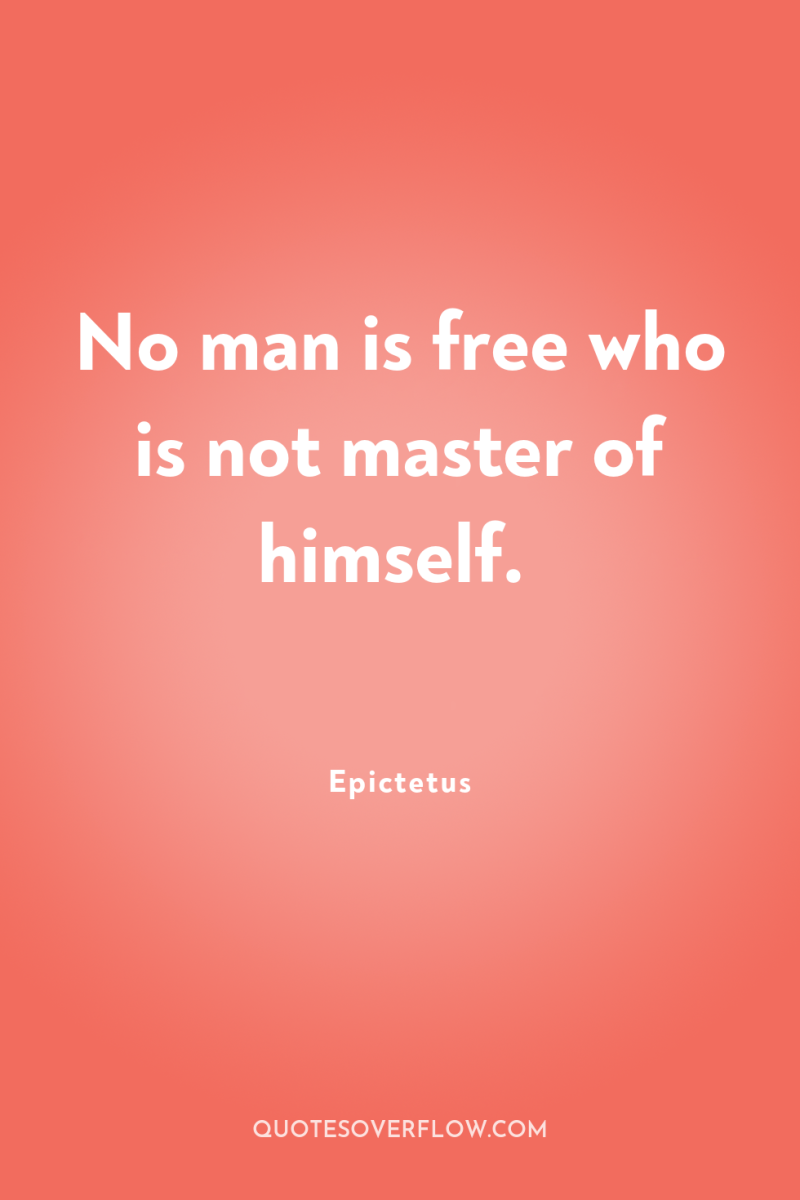
2
No man is free who is not master of himself.Epictetus
3
If anyone tells you that a certain person speaks ill of you, do not make excuses about what is said of you but answer, "He was ignorant of my other faults, else he would not have mentioned these alone.Epictetus
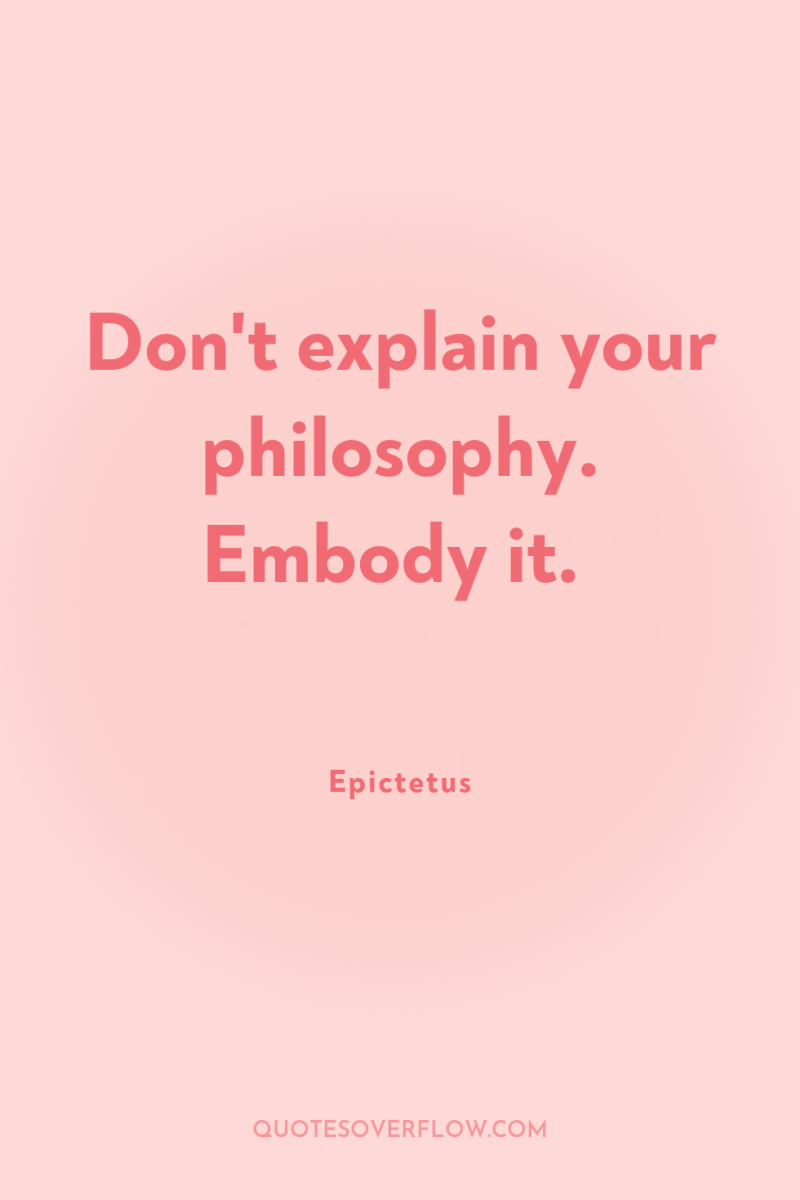
4
Don't explain your philosophy. Embody it.Epictetus
5
Don't just say you have read books. Show that through them you have learned to think better, to be a more discriminating and reflective person. Books are the training weights of the mind. They are very helpful, but it would be a bad mistake to suppose that one has made progress simply by having internalized their contents." Translation by Sharon LebellEpictetus
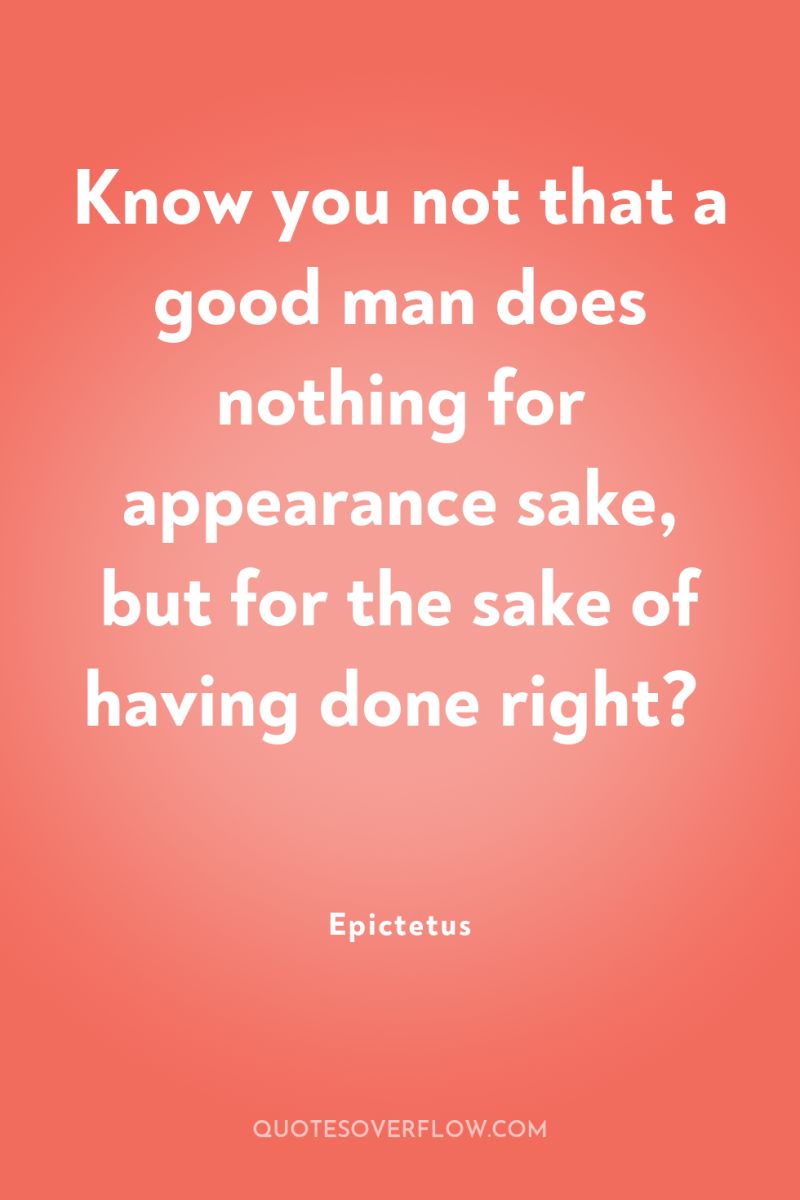
6
Know you not that a good man does nothing for appearance sake, but for the sake of having done right?Epictetus
7
Remember, it is not enough to be hit or insulted to be harmed, you must believe that you are being harmed. If someone succeeds in provoking you, realize that your mind is complicit in the provocation. Which is why it is essential that we not respond impulsively to impressions; take a moment before reacting, and you will find it easier to maintain control.Epictetus
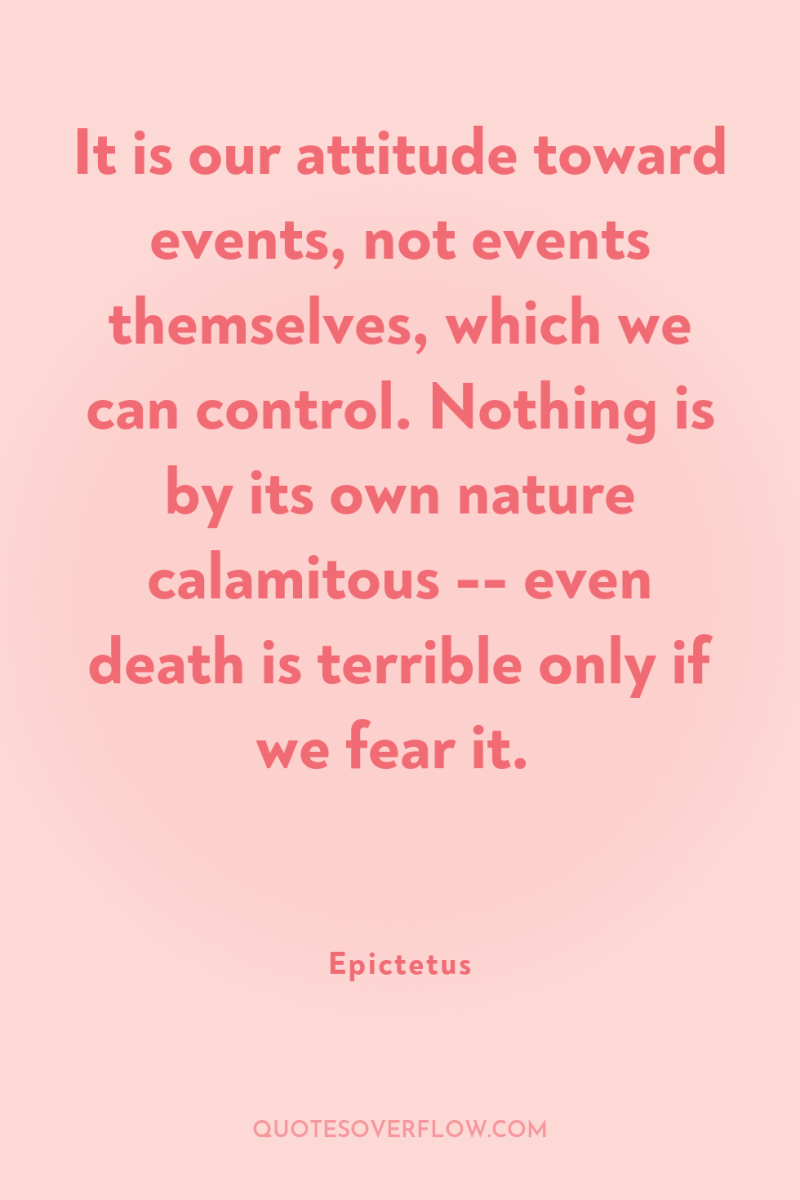
8
It is our attitude toward events, not events themselves, which we can control. Nothing is by its own nature calamitous -- even death is terrible only if we fear it.Epictetus
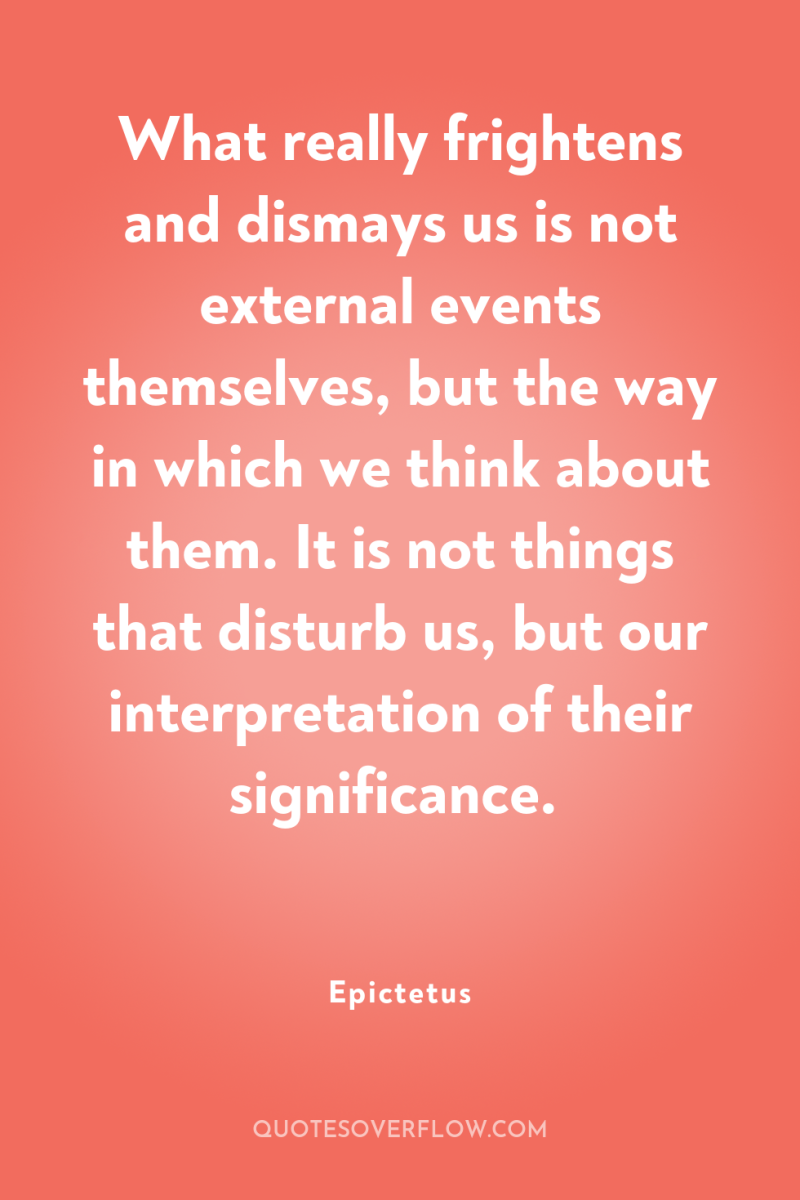
9
What really frightens and dismays us is not external events themselves, but the way in which we think about them. It is not things that disturb us, but our interpretation of their significance.Epictetus
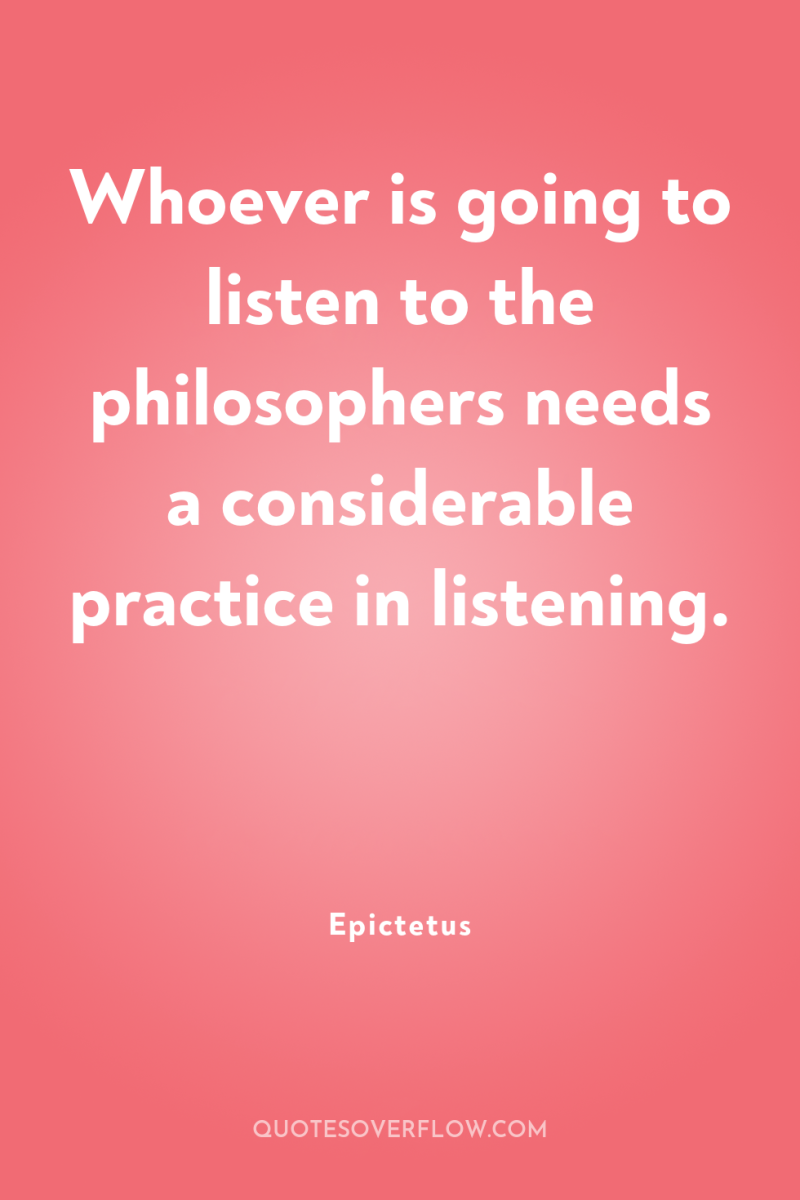
10
Whoever is going to listen to the philosophers needs a considerable practice in listening.Epictetus
11
When a youth was giving himself airs in the Theatre and saying, 'I am wise, for I have conversed with many wise men, ' Epictetus replied, 'I too have conversed with many rich men, yet I am not rich! ’.Epictetus
12
When any person harms you, or speaks badly of you, remember that he acts or speaks from a supposition of its being his duty. Now, it is not possible that he should follow what appears right to you, but what appears so to himself. Therefore, if he judges from a wrong appearance, he is the person hurt, since he too is the person deceived. For if anyone should suppose a true proposition to be false, the proposition is not hurt, but he who is deceived about it. Setting out, then, from these principles, you will meekly bear a person who reviles you, for you will say upon every occasion, "It seemed so to him."..Epictetus
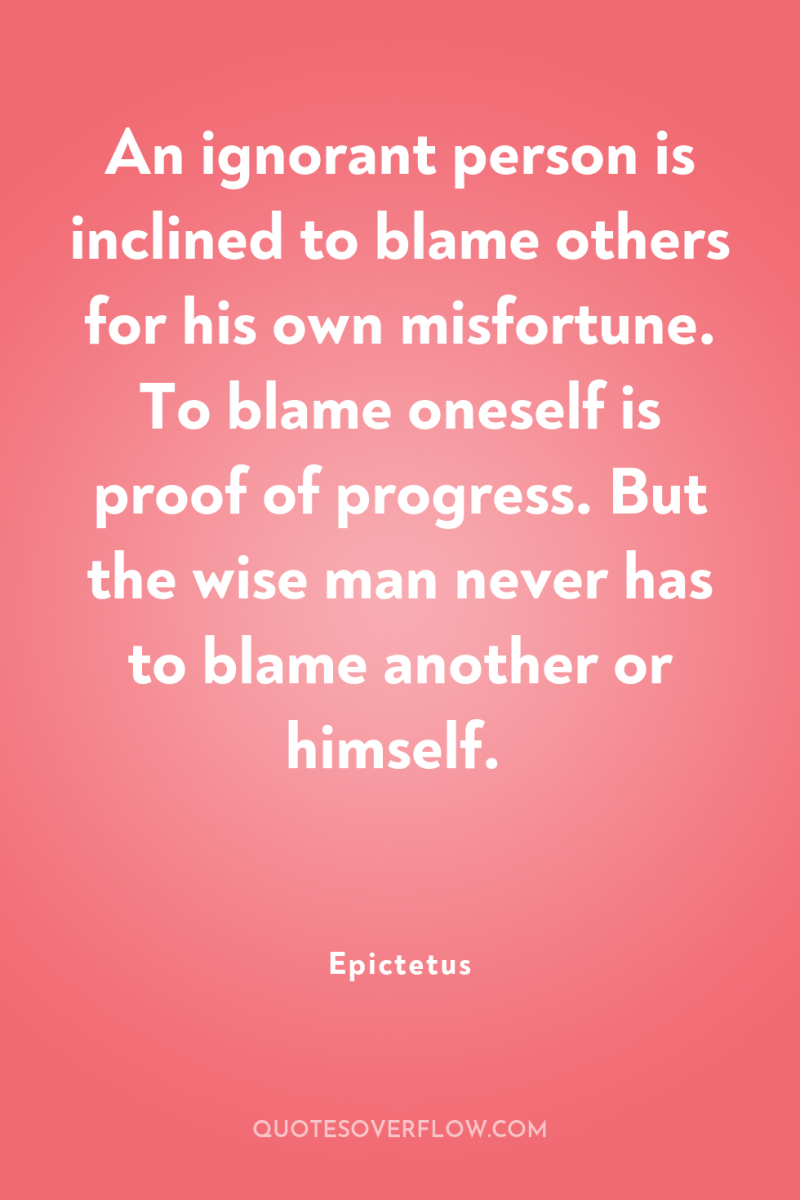
13
An ignorant person is inclined to blame others for his own misfortune. To blame oneself is proof of progress. But the wise man never has to blame another or himself.Epictetus
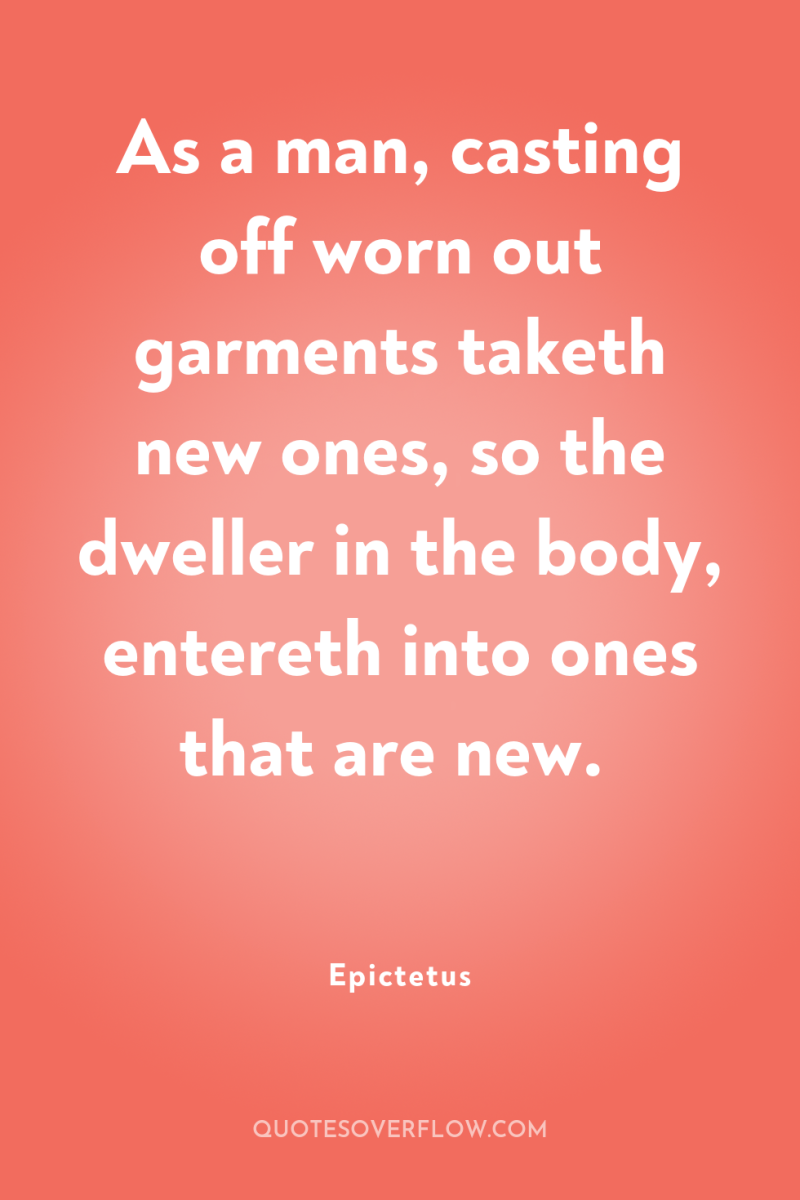
14
As a man, casting off worn out garments taketh new ones, so the dweller in the body, entereth into ones that are new.Epictetus
15
If you want to make progress, put up with being perceived as ignorant or naive in worldly matters, don't aspire to a reputation for sagacity. If you do impress others as somebody, don't altogether believe it. You have to realize, it isn't easy to keep your will in agreement with nature, as well as externals. Caring about the one inevitably means you are going to shortchange the other.Epictetus
16
Remember to act always as if you were at a symposium. When the food or drink comes around, reach out and take some politely; if it passes you by don't try pulling it back. And if it has not reached you yet, don't let your desire run ahead of you, be patient until your turn comes. Adopt a similar attitude with regard to children, wife, wealth and status, and in time, you will be entitled to dine with the gods. Go further and decline these goods even when they are on offer and you will have a share in the gods' power as well as their company. That is how Diogenes, Heraclitus and philosophers like them came to be called, and considered, divine.Epictetus
17
The first and most important field of philosophy is the application of principles such as “Do not lie.” Next come the proofs, such as why we should not lie. The third field supports and articulates the proofs, by asking, for example, “How does this prove it? What exactly is a proof, what is logical inference, what is contradiction, what is truth, what is falsehood?” Thus, the third field is necessary because of the second, and the second because of the first. The most important, though, the one that should occupy most of our time, is the first. But we do just the opposite. We are preoccupied with the third field and give that all our attention, passing the first by altogether. The result is that we lie — but have no difficulty proving why we shouldn’t.Epictetus

18
The philosopher's school, ye men, is a surgery: you ought not to go out of it with pleasure, but with pain. For you are not in sound health when you enter.Epictetus
19
God save me from fools with a little philosophy–no one is more difficult to reach.Epictetus
20
Philosophy does not promise to secure anything external for man, otherwise it would be admitting something that lies beyond its proper subject-matter. For as the material of the carpenter is wood, and that of statuary bronze, so the subject-matter of the art of living is each person's own life.Epictetus

21
For in this Case, we are not to give Credit to the Many, who say, that none ought to be educated but the Free; but rather to the Philosophers, who say, that the Well-educated alone are free.Epictetus
22
Philosophy does not claim to secure for us anything outside our control. Otherwise it would be taking on matters that do not concern it. For as wood is the material of the carpenter, and marble that of the sculptor, so the subject matter of the art of life is the life of the self.Epictetus
23
What would have become of Hercules do you think if there had been no lion, hydra, stag or boar - and no savage criminals to rid the world of? What would he have done in the absence of such challenges? Obviously he would have just rolled over in bed and gone back to sleep. So by snoring his life away in luxury and comfort he never would have developed into the mighty Hercules. And even if he had, what good would it have done him? What would have been the use of those arms, that physique, and that noble soul, without crises or conditions to stir into him action? .Epictetus
24
If a person gave your body to any stranger he met on is way, you would certainly be angry. And do you feel no shame in handing over your own mind to be confused and mystified by anyone who happens to verbally attack you?Epictetus

25
He who exercises wisdom, exercises the knowledge which is about God.Epictetus

26
Is it not the same distance to God everywhere?Epictetus

27
It is much better to die of hunger unhindered by grief and fear than to live affluently beset with worry, dread, suspicion and unchecked desire.Epictetus

28
No man is free until he s a master of himself! !Epictetus
29
Wealth consists not in having great possessions, but in having few wants.Epictetus
30
There is only one way to happiness and that is to cease worrying about things which are beyond the power or our will.Epictetus

31
I must die. Must I then die lamenting? I must be put in chains. Must I then also lament? I must go into exile. Does any man then hinder me from going with smiles and cheerfulness and contentment?Epictetus

32
The essence of philosophy is that a man should so live that his happiness shall depend as little as possible on external things.Epictetus
33
Concerning the Gods, there are those who deny the very existence of the Godhead; others say that it exists, but neither bestirs nor concerns itself not has forethought far anything. A third party attribute to it existence and forethought, but only for great and heavenly matters, not for anything that is on earth. A fourth party admit things on earth as well as in heaven, but only in general, and not with respect to each individual. A fifth, of whom were Ulysses and Socrates, are those that cry: --I move not without Thy knowledge!.Epictetus

34
If you wish to be a writer, write.Epictetus
35
The condition and characteristic of an uninstructed person is this: he never expects from himself profit (advantage) nor harm, but from externals. The condition and characteristic of a philosopher is this: he expects all advantage and all harm from himself.Epictetus
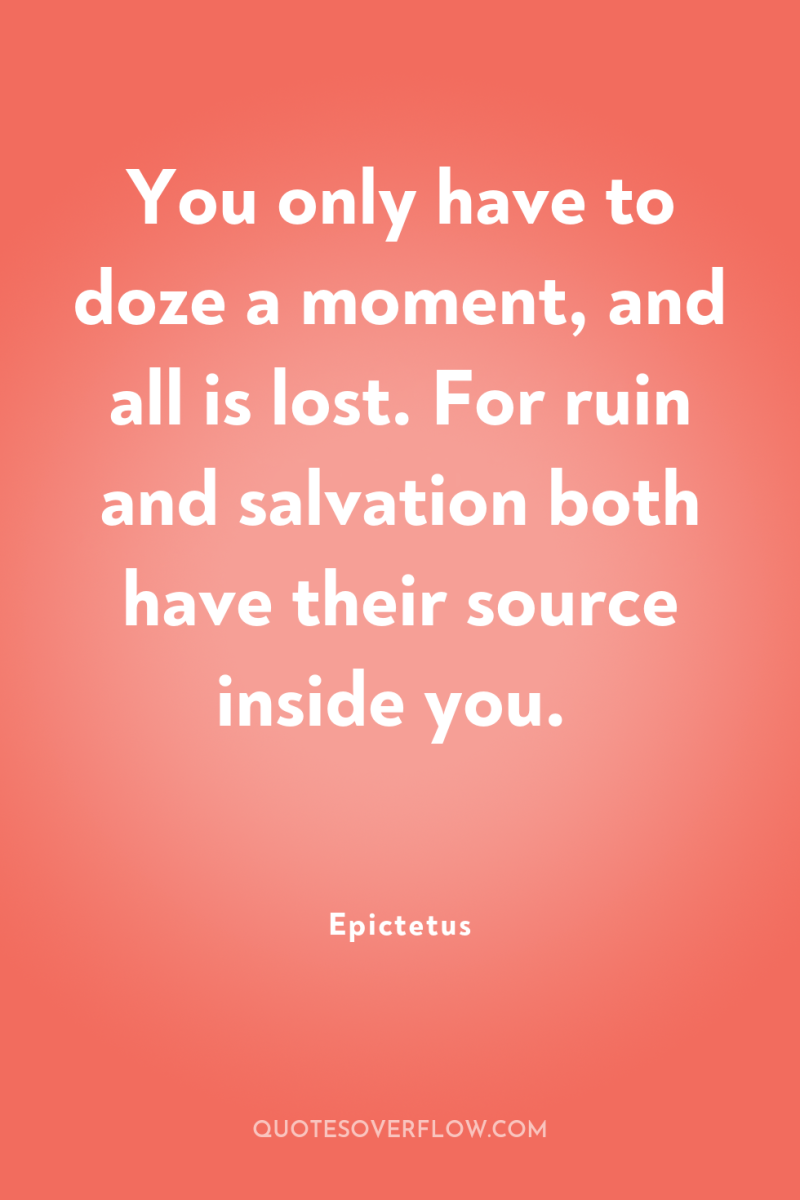
36
You only have to doze a moment, and all is lost. For ruin and salvation both have their source inside you.Epictetus

37
Only the educated are free.Epictetus

38
First say to yourself what you would beand then do what you have to do.Epictetus
39
Now is the time to get serious about living your ideals. How long can you afford to put off who you really want to be? Your nobler self cannot wait any longer. Put your principles into practice — now. Stop the excuses and the procrastination. This is your life! You aren’t a child anymore. The sooner you set yourself to your spiritual program, the happier you will be. The longer you wait, the more you’ll be vulnerable to mediocrity and feel filled with shame and regret, because you know you are capable of better. From this instant on, vow to stop disappointing yourself. Separate yourself from the mob. Decide to be extraordinary and do what you need to do — now. .Epictetus
40
Don’t just say you have read books. Show that through them you have learned to think better, to be a more discriminating and reflective person. Books are the training weights of the mind. They are very helpful, but it would be a bad mistake to suppose that one has made progress simply by having internalized their contents.Epictetus
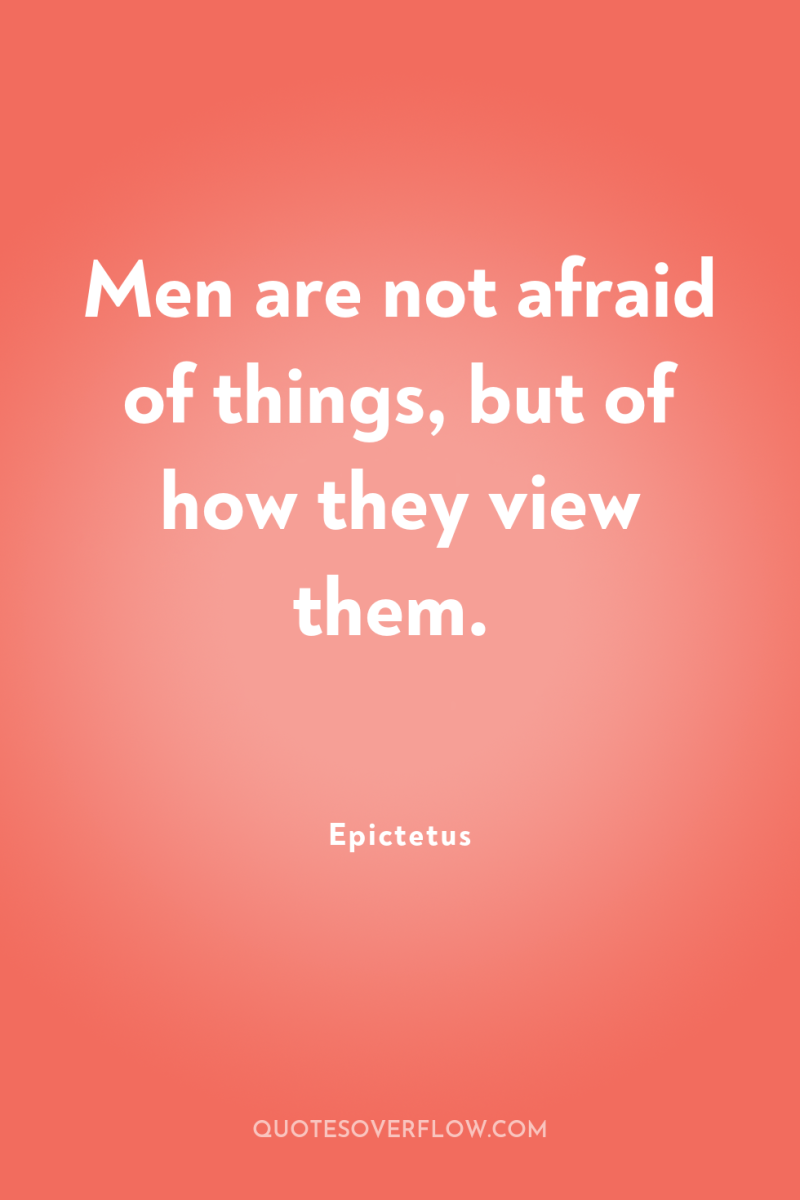
41
Men are not afraid of things, but of how they view them.Epictetus
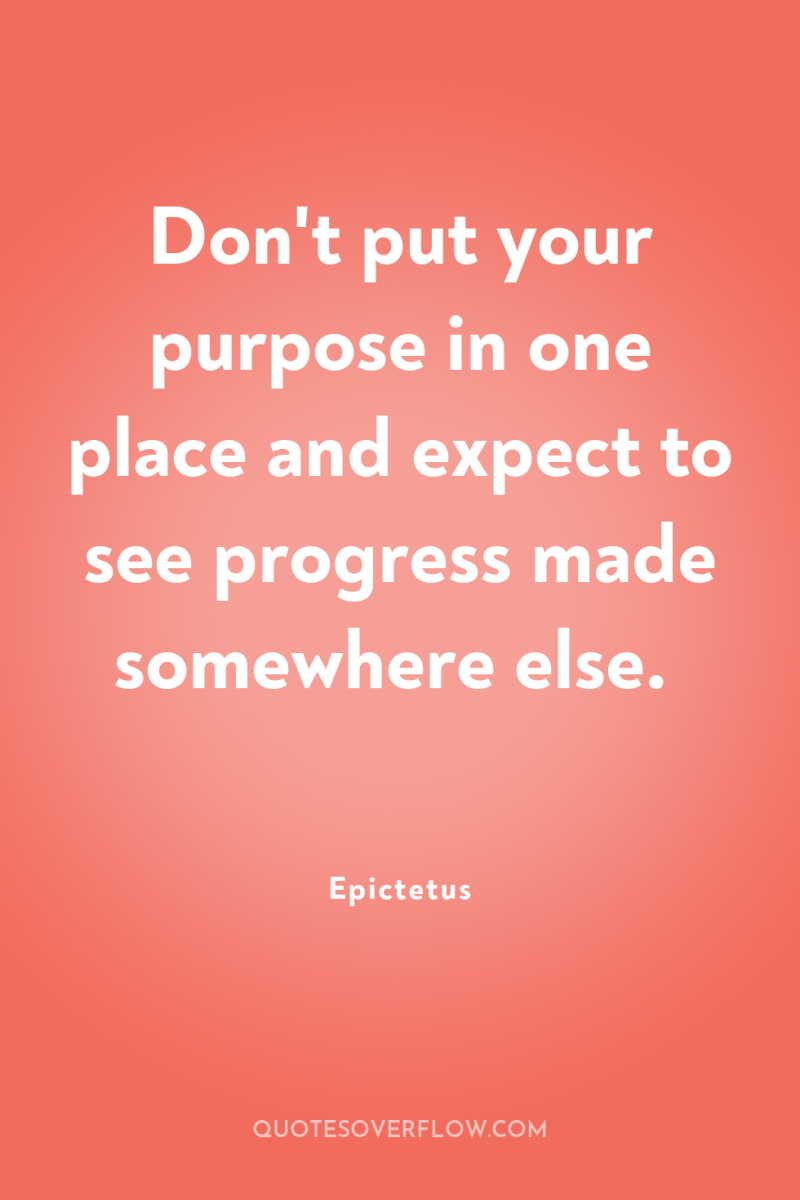
42
Don't put your purpose in one place and expect to see progress made somewhere else.Epictetus
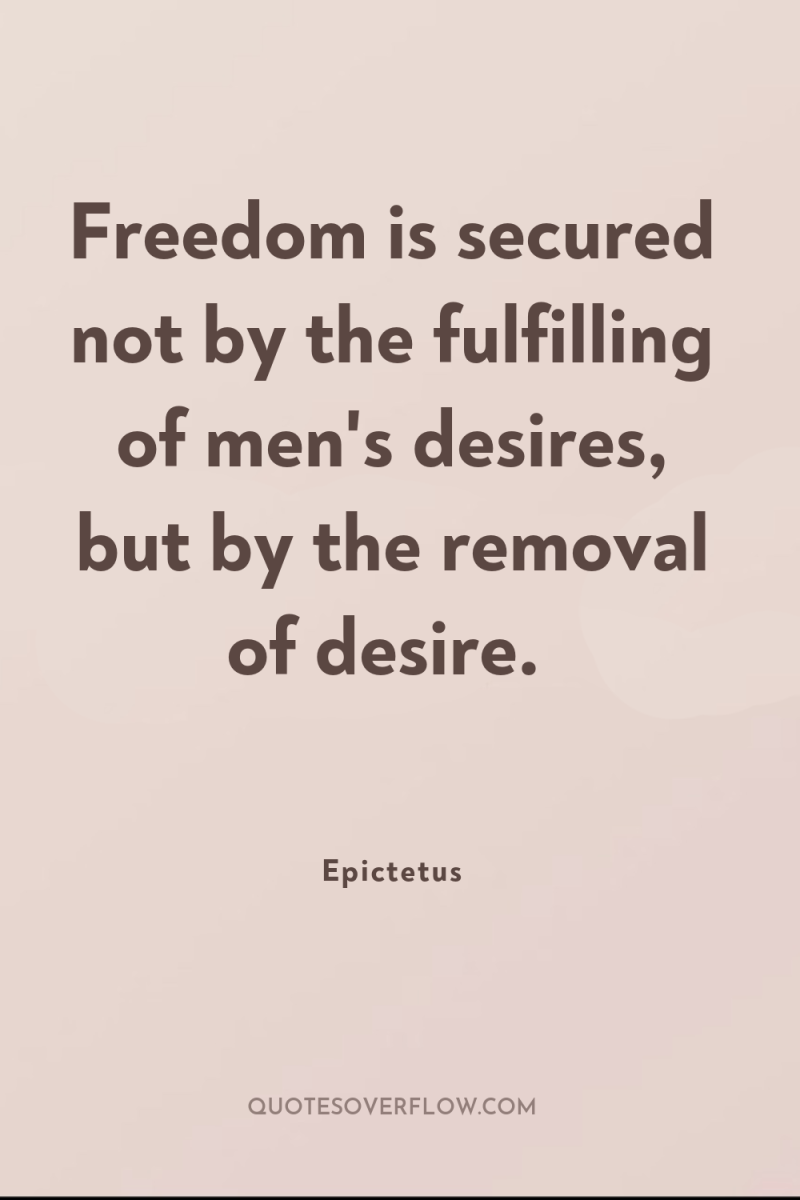
43
Freedom is secured not by the fulfilling of men's desires, but by the removal of desire.Epictetus
44
What you shun enduring yourself, attempt not to impose on others. You shun slavery- beware enslaving others! If you can endure to do that, one would think you had been once upon a time a slave yourself. For vice has nothing in common with virtue, nor Freedom with slavery.Epictetus
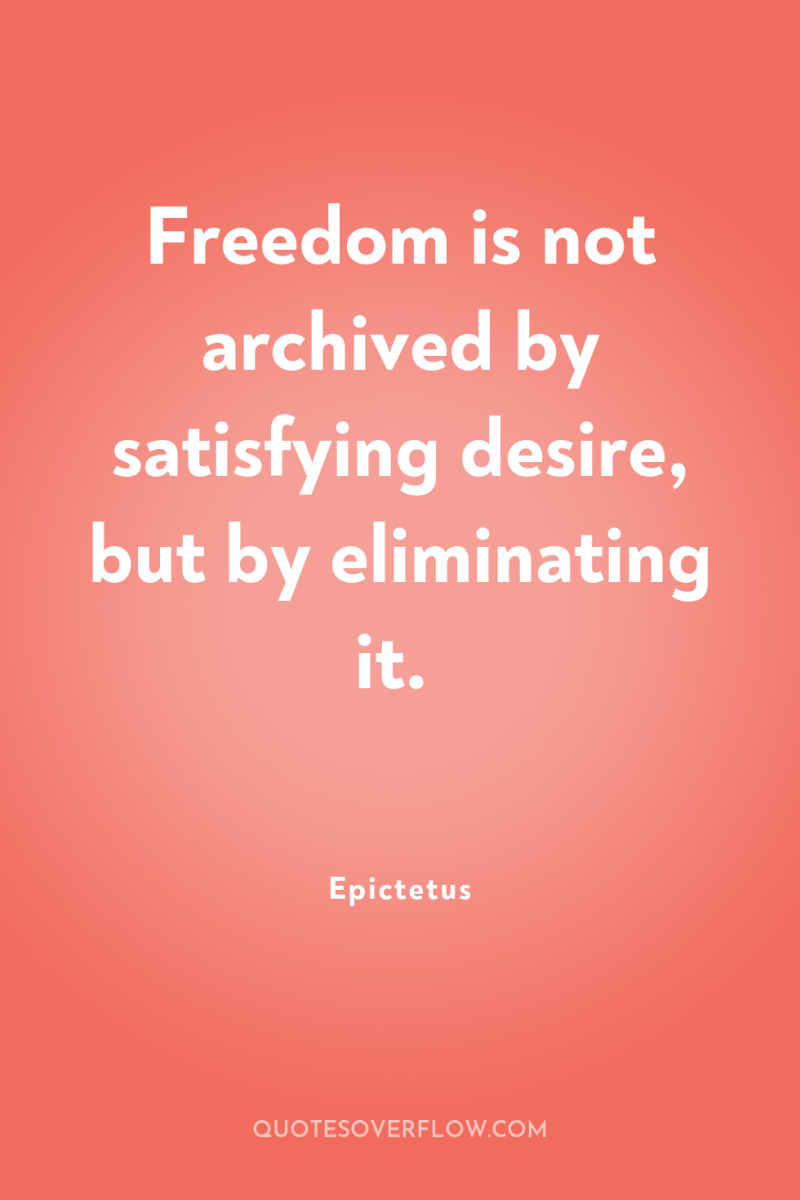
45
Freedom is not archived by satisfying desire, but by eliminating it.Epictetus

46
Freedom, you see, is having events go in accordance with our will, never contrary to it.Epictetus
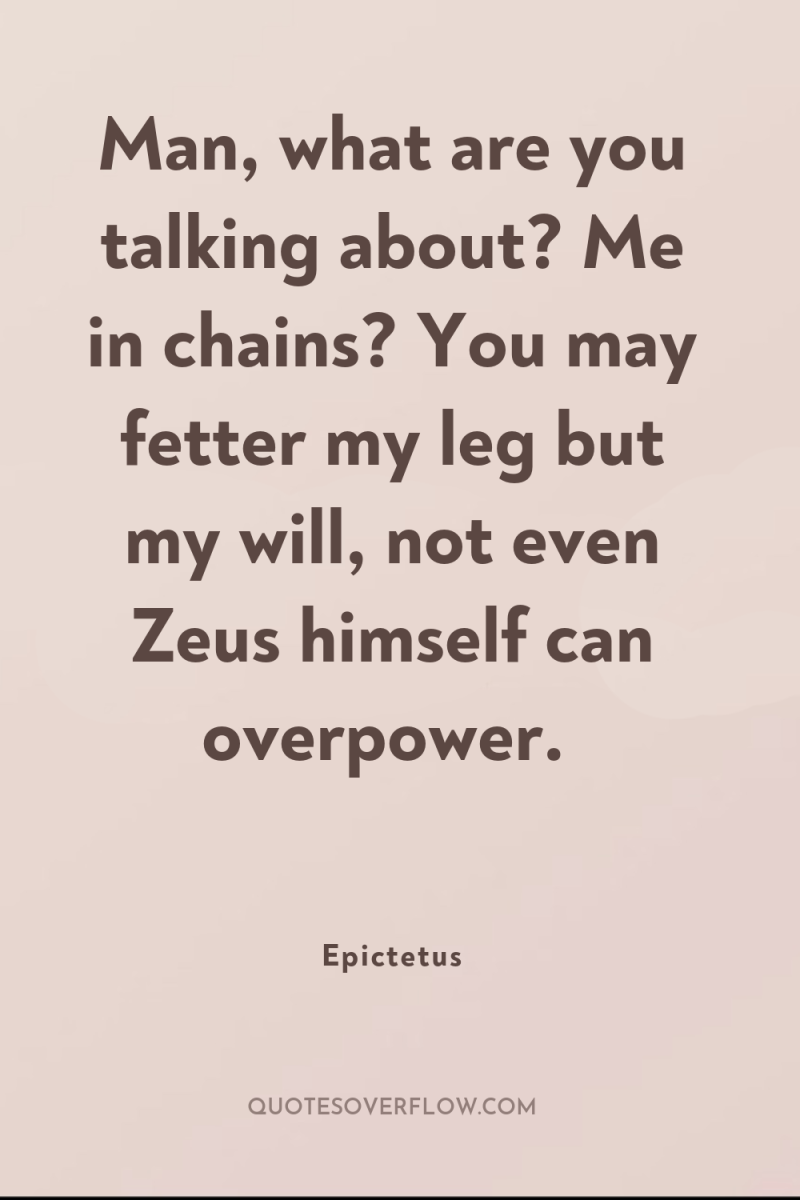
47
Man, what are you talking about? Me in chains? You may fetter my leg but my will, not even Zeus himself can overpower.Epictetus
48
In the long run, every man will pay the penalty for his own misdeeds. The man who remembers this will be angry with no one, indignant with no one, revile no one, blame no one, offend no one, hate no one.Epictetus
49
So what oppresses and scares us? It is our own thoughts, obviously, What overwhelms people when they are about to leaves friends, family, old haunts and their accustomed way of life? Thoughts.Epictetus
50
When you do anything from a clear judgment that it ought to be done, never shrink from being seen to do it, even though the world should misunderstand it; for if you are not acting rightly, shun the action itself; if you are, why fear those who wrongly censure you?Epictetus
51
Very little is needed for everything to be upset and ruined, only a slight lapse in reason.Epictetus
52
And where there is ignorance, there is also want of learning and instruction in essentials.Epictetus
53
If you have assumed any character beyond your strength, you have both demeaned yourself ill in that and quitted one which you might have supported.Epictetus
54
It is impossible to begin to learn that which one thinks one already knows.Epictetus
55
It is not so much what happens to you as how you think about what happens." EpictetusEpictetus
56
How long are you going to wait before you demand the best for yourself and in no instance bypass the discriminations of reason? You have been given the principles that you ought to endorse, and you have endorsed them. What kind of teacher, then, are you still waiting for in order to refer your self-improvement to him? You are no longer a boy, but a full-grown man. If you are careless and lazy now and keep putting things off and always deferring the day after which you will attend to yourself, you will not notice that you are making no progress, but you will live and die as someone quite ordinary. From now on, then, resolve to live as a grown-up who is making progress, and make whatever you think best a law that you never set aside. And whenever you encounter anything that is difficult or pleasurable, or highly or lowly regarded, remember that the contest is now: you are at the Olympic Games, you cannot wait any longer, and that your progress is wrecked or preserved by a single day and a single event. That is how Socrates fulfilled himself by attending to nothing except reason in everything he encountered. And you, although you are not yet a Socrates, should live as someone who at least wants to be a Socrates. .Epictetus
57
Man is not worried by real problems so much as by his imagined anxieties about real problemsEpictetus
58
You know yourself what you are worth in your own eyes; and at what price you will sell yourself. For men sell themselves at various prices. This is why, when Florus was deliberating whether he should appear at Nero's shows, taking part in the performance himself, Agrippinus replied, 'Appear by all means.' And when Florus inquired, 'But why do not you appear?' he answered, 'Because I do not even consider the question.' For the man who has once stooped to consider such questions, and to reckon up the value of external things, is not far from forgetting what manner of man he is.Epictetus
59
Thus Epicurus also, when he designs to destroy the natural fellowship of mankind, at the same time makes use of that which he destroys. For what does he say? ‘Be not deceived, men, nor be led astray, nor be mistaken: there is no natural fellowship among rational animals; believe me. But those who say otherwise, deceive you and seduce you by false reasons.’– What is this to you? Permit us to be deceived. Will you fare worse, if all the rest of us are persuaded that there is a natural fellowship among us, and that it ought by all means to be preserved? Nay, it will be much better and safer for you. Man, why do you trouble yourself about us? Why do you keep awake for us? Why do you light your lamp? Why do you rise early? Why do you write so many books, that no one of us may be deceived about the gods and believe that they take care of men; or that no one may suppose the nature of good to be other than pleasure? For if this is so, lie down and sleep, and lead the life of a worm, of which you judged yourself worthy: eat and drink, and enjoy women, and ease yourself, and snore. And what is it to you, how the rest shall think about these things, whether right or wrong? For what have we to do with you? You take care of sheep because they supply us with wool and milk, and last of all with their flesh. Would it not be a desirable thing if men could be lulled and enchanted by the Stoics, and sleep and present themselves to you and to those like you to be shorn and milked? For this you ought to say to your brother Epicureans: but ought you not to conceal it from others, and particularly before every thing to persuade them, that we are by nature adapted for fellowship, that temperance is a good thing; in order that all things may be secured for you? Or ought we to maintain this fellowship with some and not with others? With whom then ought we to maintain it? With such as on their part also maintain it, or with such as violate this fellowship? And who violate it more than you who establish such doctrines? What then was it that waked Epicurus from his sleepiness, and compelled him to write what he did write?.Epictetus
60
A city is not adorned by external things, but by the virtue of those who dwell in it.Epictetus
61
As the sun does not wait for prayers and incantations tob e induced to rise, but immediately shines and is saluted by all, so do you also not wait for clappings of hands and shouts of praise tob e induced to do good, but be a doer of good voluntarily and you will be beloved as much as the sun.Epictetus
62
Fortify yourself with contentment for this is an impregnable fortress.Epictetus
63
You may fetter my leg, but Zeus himself cannot get the better of my free will.Epictetus
64
Why do you want to read anyway — for the sake of amusement or mere erudition? Those are poor, fatuous pretexts. Reading should serve the goal of attaining peace; if it doesn’t make you peaceful, what good is it?Epictetus
65
Reading should serve the goal of attaining peace; if it doesn’t make you peaceful, what good is it?Epictetus
66
I cannot call somebody ‘hard-working’ knowing only that they read and write. Even if ‘all night long’ is added, I cannot say it — not until I know the focus of all this energy.Epictetus
67
Isn’t reading a kind of preparation for life?’ But life is composed of things other than books. It is as if an athlete, on entering the stadium, were to complain that he’s not outside exercising. This was the goal of your exercise, of your weights, your practice ring and your training partners.Epictetus
68
If, on the other hand, we read books entitled On Impulse not just out of idle curiosity, but in order to exercise impulse correctly; books entitled On Desire and On Aversion so as not to fail to get what we desire or fall victim to what we would rather avoid; and books entitled On Moral Obligation in order to honour our relationships and never do anything that clashes or conflicts with this principle; then we wouldn’t get frustrated and grow impatient with our reading. Instead we would be satisfied to act accordingly. And rather than reckon, as we are used to doing, ‘How many lines I read, or wrote, today, ’ we would pass in review how ‘I applied impulse today the way the philosophers recommend .Epictetus
69
Once I was liable to the same mistakes, but, thanks to God, no longer …’Well, isn’t it just as worthwhile to have devoted and applied yourself to this goal as to have read or written fifty pages?Epictetus
70
We should realize that an opinion is not easily formed unless a person says and hears the same things every day and practises them in real life.Epictetus
71
It isn't death, pain, exile or anything else you care to mention that accounts for the way we act, only our opinion about death, pain and the rest.Epictetus
72
Nothing great is created suddenly any more than a bunch of grapes or a fig. If you tell me that you desire a fig I answer you that there must be time. Let it first blossom then bear fruit then ripen.Epictetus
73
Practice yourself for heaven's sake in little things and thence proceed to greater.Epictetus
74
Ask not that events should happen as you will but let your will be that events should happen as they do and you shall have peace.Epictetus
75
There is only one way to happiness and that is to cease worrying about things which are beyond the power of our will.Epictetus
76
Difficulties are things that show what men are.Epictetus
77
It is not death or pain that is to be dreaded but the fear of pain or death.Epictetus
78
All philosophy in two words - sustain and abstain.Epictetus
79
So when the crisis is upon you remember that God like a trainer of wrestlers has matched you with a tough and stalwart antagonist... that you may prove a victor at the Great Games.Epictetus
80
No great thing is created suddenly any more than a bunch of grapes or a fig. If you tell me that you desire a fig I answer you that there must be time. Let it first blossom then bear fruit then ripen.Epictetus
81
He is a drunkard who takes more than three glasses though he be not drunk.Epictetus
82
We are not troubled by things but by the opinion which we have of things.Epictetus
83
Men are not influenced by things but by their thoughts about things.Epictetus
84
On the occasion of every accident that befalls you ... inquire what power you have for turning it to use.Epictetus
85
He is a man of sense who does not grieve for what he has not but rejoices in what he has.Epictetus
86
Freedom is not procured by a full enjoyment of what is desired but by controlling the desire.Epictetus
87
Bear and forbear.Epictetus
88
First say to yourself what you would be and then do what you have to do.Epictetus
89
There is only one way to happiness and that is to cease worrying about things which are beyond the power of our will.Epictetus
90
No great thing is created suddenly.Epictetus
91
It is no easy thing for a principle to become a man's own unless each day he maintains it and works it out in his life.Epictetus
92
Do you know that disease and death must needs overtake us no matter what we are doing? ... What do you wish to be doing when it overtakes you? If you have anything better to be doing when you are so overtaken get to work on that.Epictetus
93
All philosophy lies in two words sustain and abstain.Epictetus
94
Here is the beginning of philosophy: a recognition of the conflicts between men a search for their cause a condemnation of mere opinion ... and the discovery of a standard of judgement.Epictetus
95
If you wish to live a life free from sorrow think of what is going to happen as if it had already happened.Epictetus
96
Do you know that disease and death must needs overtake us no matter what we are doing? ... What do you wish to be doing when it overtakes you?... If you have anything better to be doing when you are so overtaken get to work on that.Epictetus
97
Freedom is not procured by a full enjoyment of what is desired but by controlling that desire.Epictetus
98
Ruin and recovery are both from within.Epictetus
99
God has entrusted me with myself.Epictetus
100
Nature has given to men one tongue but two ears that we may hear from others twice as much as we speak.Epictetus